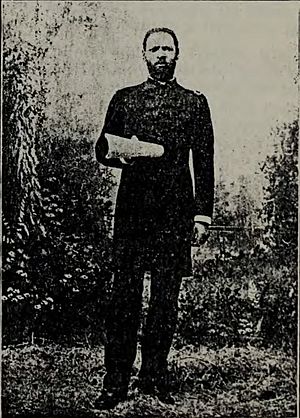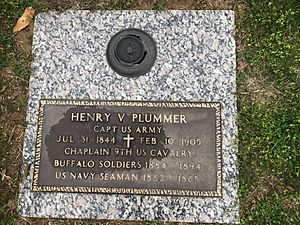Henry V. Plummer facts for kids
Quick facts for kids
Henry Vinton Plummer
|
|
|---|---|
 |
|
| Born | July 30, 1844 Three Sisters Plantation, near Bowie, Maryland
|
| Died | February 19, 1905 (aged 60) Kansas City, Kansas
|
| Resting place | National Harmony Memorial Park Landover, Maryland |
| Nationality | American |
| Occupation | Baptist preacher, United States Army chaplain |
Henry Vinton Plummer (July 30, 1844 – February 10, 1905) was an important American Baptist preacher and chaplain. He served with the United States Army's Buffalo Soldiers. Born into slavery in Maryland, he escaped when he was in his early 20s. He then joined the Union Navy during the American Civil War.
After the war, he became a pastor at several churches. In 1884, President Chester A. Arthur chose him to be the chaplain of the 9th Cavalry Regiment. At that time, he was the only black officer in the US Army. His time in the Army ended in 1894. However, his military record was reviewed in 2005, and his discharge was changed to honorable.
Contents
Henry Plummer's Early Life and Freedom
Henry Vinton Plummer was born on July 30, 1844. He was born into slavery on the Three Sisters Plantation near Bowie, Maryland. His parents were Adam Francis Plummer and Emily Saunders Plummer. He had several sisters, including Sarah Miranda Plummer Clark and Nellie Arnold Plummer.
In 1851, Henry and his mother were sold. In 1862, Plummer escaped from slavery. He traveled to Riversdale Plantation in Prince George's County to find his father. He hid there for a while. In 1864, he joined the Union Navy during the American Civil War. After the war, he got married and had several children, including H. Vinton Plummer.
Plummer's Career Before the Army
After the war, Plummer worked as a coachman and gardener. He also became very active in politics and religious life. These activities took place in the Maryland suburbs of Washington DC.
In 1870, Plummer helped start the Union Association of Bladensburg, Maryland. The next year, in 1871, he got a job as a watchman for the US Postal Service in Washington DC.
In 1872, he began studying at Wayland Seminary in Washington. After he graduated, he became the pastor at St. Paul Baptist Church in Bladensburg, Maryland. He led St. Paul's Church from 1876 to 1881. In 1876, he also helped create Mount Carmel Church in Washington, DC. He became the pastor of Mount Carmel Church in 1882 and served there until 1884.
Plummer was also involved in politics. He represented Prince George's County at the State Republican Convention in 1872 and 1876. In 1882, he was part of the executive committee of the Maryland Republican Association. He was also active in the First Washington Baptist Association in the early 1880s. In 1883, he was considered as a Republican candidate for the Maryland House of Delegates. However, he was not chosen for the nomination.
Serving as an Army Chaplain
In 1884, President Chester A. Arthur appointed Plummer as chaplain of the 9th Cavalry Regiment. This appointment was strongly supported by Hart B. Holton. Plummer replaced Chaplain Pierce. He was the only black officer in the Army at that time, holding the rank of captain. By 1890, three more black officers had joined the Army. These included Charles Young and John H. Alexander, both also in the 9th Cavalry. Allen Allensworth served in the 24th Infantry. All of them served in black regiments.
From August 1, 1885, to March 10, 1891, Plummer was stationed at Fort McKinney in Wyoming. He also served for a time at Fort Riley in Kansas. Plummer was a very busy chaplain. Hundreds of people attended his services. He also led a popular Sunday School. In 1892 and 1893, he started meetings to encourage people to avoid alcohol. He also founded a Temperance society.
His work sometimes caused disagreements. While he was at Fort Robinson in Nebraska, he started a newspaper. In it, he wrote under a different name. He suggested that black soldiers at the fort should physically defend themselves. This was against unfair treatment they received in nearby Crawford, Nebraska.
In August 1894, Plummer suggested a plan to the Secretary of War, Daniel S. Lamont. He wanted to explore parts of Africa. Bishop Henry Turner and others who supported African Americans moving to Africa backed his idea. However, his Army career ended shortly after, in September.
On August 23, 1894, Plummer faced a military hearing. He was accused of certain actions that led to his discharge. This happened even though Plummer had supported temperance. He had even organized a group to ban alcohol sales at Fort Robinson. After an 11-day hearing, he was found responsible on September 7. Appeals by Plummer and his wife were not successful. George W. Prioleau replaced Plummer as chaplain of the 9th Cavalry.
Life After the Army and His Death

After leaving the Army, Plummer returned to Washington DC. He became a leader in the Baptist Minister's Union in 1899. Soon after, he moved to Kansas City, Kansas. There, he continued to be a religious leader. He also remained active in the local Republican Party.
Plummer passed away on February 10, 1905. In 1924, his sister Nellie wrote a book. It included a chapter about Henry Plummer's life.
Efforts to Clear His Name
Many people worked to clear Plummer's name in Army records. In 1978, Army chaplain Earl V. Stover wrote a book about army chaplains. He also wrote an article about Plummer. Stover believed Plummer was treated unfairly because of his race. He asked for Plummer's discharge to be changed to honorable.
In 2002, Plummer's great-nephew, L. Jerome Fowler, created a group. It was called the Committee to Clear Chaplain Plummer. Their goal was to fix Plummer's Army record. In 2003, after the group appealed, the Prince George's County Council passed a resolution. This resolution asked the president, Congress, the defense secretary, and the Army to review Plummer's case.
In February 2005, the Army officially changed Plummer's discharge to honorable. However, they did not remove the record of his military hearing from his file.

